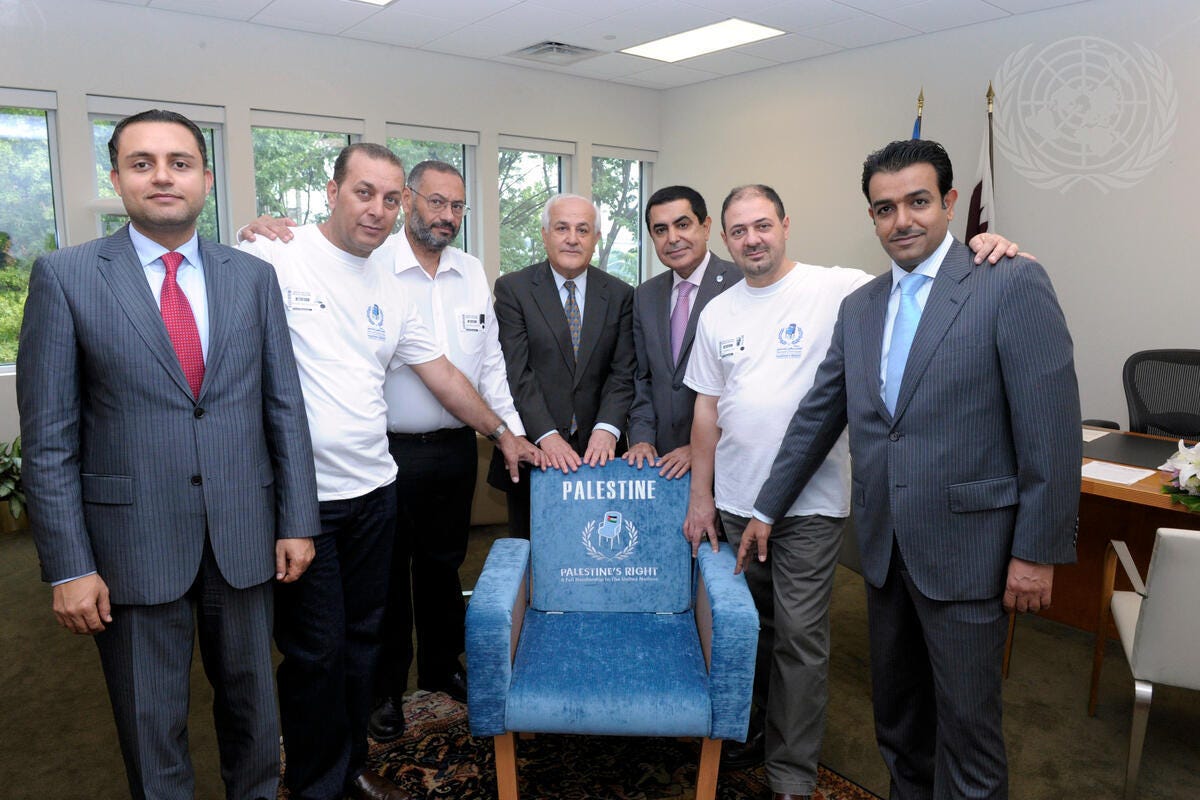Why "The State of Palestine" Can't Join the United Nations
A vote is coming
UPDATE: A UN Security Council vote on admitting Palestine as a full member of the United Nations is scheduled for 5 PM New York Time on Thursday April 18.
Thirteen years ago, it was not terribly unusual to see Palestine’s representative to the United Nations trotting around headquarters carrying a large chair. It was plush, the color "UN-blue," and embroidered with the picture of another chair, this time with the Palestinian flag superimposed. An inscription on the backrest read: "Palestine’s Right: Full Membership to the United Nations."
The chair was a prop used for Palestine’s 2011 campaign for full-fledged membership to the United Nations. That effort was partially successful. The Security Council blocked Palestine’s bid for full membership, but a few months later, the General Assembly overwhelmingly agreed to upgrade Palestine’s official presence at the United Nations to a “non-member observer state.” This put The State of Palestine on par with The Holy See (The Vatican), giving Palestinian representatives most of the privileges that UN-member states have, like participating in meetings and co-sponsoring resolutions. But not all — they don’t have a vote in the General Assembly and could not join key UN bodies as full voting members.
That last big push for Palestinian membership to the United Nations was over a decade ago.
They are trying again.
On April 2, Palestine issued a formal request to the Secretary-General for the reconsideration of its 2011 application. Antonio Guterres duly transmitted that request to the Security Council. On Thursday, the Council will hold a formal vote over whether or not to admit The State of Palestine as the 194th full-fledged member of the United Nations.
How To Become a United Nations Member State
I do a lot of public speaking about the UN. One mantra I invoke often is that at the United Nations, the process determines outcomes. This may hold true in any bureaucracy, but it is particularly salient at the UN.
To become a member state, an entity must transmit its intentions to the Secretary-General as a “peace-loving nation” that accepts the obligations contained in the Charter of the United Nations. The Secretary-General then passes this along to both the General Assembly and the Security Council. Both bodies must agree. At the General Assembly, the process is straightforward: two-thirds of its members must support membership in a vote. At the Security Council, things get complicated.
The Security Council has a “standing committee” that evaluates these membership applications. Notably, this standing committee is composed of all 15 members of the Council. After some discussion, this committee (which again, includes all members of the Council) passes their recommendation along to the Security Council (which again, consists of the very same members!)
This added layer provides the actual Security Council with a degree of political protection: if the committee does not approve the entity’s UN application, there may not be a need for further action, thus preventing Security Council members from casting a potentially high-profile vote.
Back in 2011, there were two applications before this Standing Committee: South Sudan and Palestine. South Sudan received the full backing of this committee, so the Security Council rubber-stamped South Sudan’s accession to the United Nations. Needless to say, this was not the case with the State of Palestine, whose application died in committee. Even though it appeared that most Security Council members agreed to Palestine’s membership, two were opposed. At least one of those was the USA which could block Palestine’s membership with its veto if put to a vote.
Thus was the fate of Palestine’s last push for full membership 13 years ago.
On Thursday, the Security Council will again take up the question of Palestinian membership to the United Nations. While this bid will almost certainly fail, the diplomatic dynamics around Palestine’s bid to join the United Nations are changing in some important and revealing ways.




